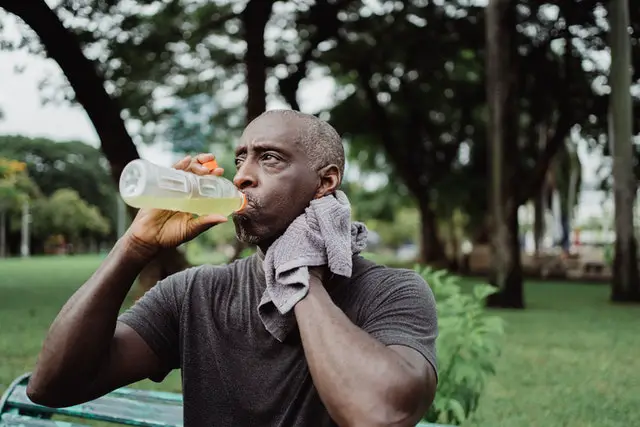
Summertime is one of the most beautiful seasons, and spending time outside is one of the greatest aspects of it. Beach excursions, barbecues, and days in the park basking in the sun are all fantastic activities.
We all know that applying sunscreen is critical to protecting our skin from sun damage, but high temperatures might result in more than a sunburn — they can also cause your body to overheat dangerously.
When your body overheats, the most serious illness that may occur is heatstroke.
However, overexposure to high temperatures can also induce heat exhaustion, which is less serious but can still be dangerous if left untreated.
What is heat exhaustion?
Heat exhaustion is a condition that can develop after you’ve been exposed to high temperatures for an extended period of time.
It can cause you to feel weak, dizzy, and nauseous. You may also have a headache, feel thirsty and sweaty, and your skin may be cool and clammy.
How common is heat exhaustion?
Heat exhaustion is a surprisingly common problem. It’s been estimated that as many as 600 people die from it each year in the United States.
What should you do if you think you have heat exhaustion?
If you start to experience any of the symptoms of heat exhaustion, it’s important to take steps to cool down your body as soon as possible.
This may include moving to a cooler location, removing excess clothing, drinking fluids, and applying cold packs or ice towels to your
What are the risks of heat exhaustion?
heat exhaustion can progress to heatstroke, which is a potentially deadly condition. Heatstroke can cause your body temperature to skyrocket, leading to damage to your brain, heart, and kidneys.
It can also result in seizures and even death.
What are the symptoms of heatstroke?
The symptoms of heatstroke include:
- Body temperature above 103 degrees Fahrenheit
- Red and hot skin
- A rapid and strong pulse
- Headache
- Dizziness
- Nausea
- Vomiting
- Confusion
- And seizures.
If you experience any of these symptoms, seek immediate medical attention.
What are the symptoms of heat exhaustion?
The symptoms of heat exhaustion include:
- Heavy sweating
- Pale and clammy skin
- Rapid heartbeat
- Weakness or light headedness
- Muscle cramps
- Lack of appetite
- Nausea or vomiting
- Fainting
If you experience any of these symptoms, move to a cooler area and drink fluids. If the condition does not improve, seek medical attention.
How can I prevent my body from overheating?
There are several ways to prevent your body from overheating:
- Drink plenty of fluids – especially water
- Wear light colored, loose fitting clothing
- Avoid going outside during the hottest part of the day
- Use sunscreen and reapply often
- Drink fluids that contain electrolytes, such as sports drinks or coconut water
- Stay in air conditioned areas as much as possible
- Pace yourself when doing physical activity outdoors
Others may need to take extra precautions to prevent their body from overheating, such as those who are pregnant, elderly, or have a chronic illness.
- Read also: What Would Happen if You Didn’t Drink Any Water
- Read also: What happens if you don’t treat a fractured rib
Why do I get overheated so easily?
There are a few reasons why you might be more susceptible to overheating:
- You’re not used to the heat – If you’re not used to high temperatures, your body will start to overheat more quickly.
- You’re dehydrated – When you’re dehydrated, your body is less able to regulate its temperature.
- You’re overweight – Carrying around extra weight makes it harder for your body to dissipate heat.
- You’re pregnant – Your body has to work harder to cool itself down, and you might be more susceptible to dehydration.
- You have a chronic illness – Conditions such as diabetes, heart disease, and respiratory illnesses can make it harder for your body to regulate its temperature.
- You’re taking certain medications – Some medications, such as diuretics and ACE inhibitors, can make you more likely to overheat.
Summary
Heat exhaustion is a condition that can develop after you’ve been exposed to high temperatures for an extended period of time.
It can cause you to feel weak, dizzy, and nauseous. You may also have a headache, feel thirsty and sweaty, and your skin may be cool and clammy.
If you start to experience any of the symptoms of heat exhaustion, it’s important to take steps to cool down your body as soon as possible.
This may include moving to a cooler location, removing excess clothing, drinking fluids, and applying cold packs or ice towels to your skin.
If the condition does not improve, seek medical attention.
There are several ways to prevent your body from overheating, including drinking plenty of fluids, wearing light colored clothing, and staying in air conditioned areas.
If you’re more susceptible to overheating, there are a few things you can do to protect yourself, such as drinking electrolyte-rich fluids and taking medications that help your body regulate its temperature.



